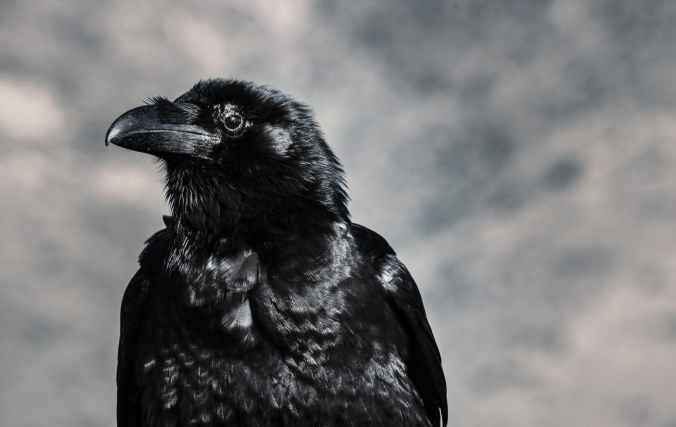“More controversy attaches to his name,” says Hughes’ biographer, the scholar Jonathan Bate, “than that of any other figure in literature, with the exception of Lord Byron.”
This documentary was originally broadcast in 2015 following the publication of Bate’s Ted Hughes: The Unauthorised Life. The programme also marked another first in that it included a substantial interview with Frieda Hughes, Hughes and Plath’s daughter. She speaks openly and movingly of her father’s life and work, the way he kept his mother’s presence alive for her children. She also describes how he taught her to skin a badger at the kitchen table as a child.
Much of the story is well-known, although Frieda Hughes states that her parents at times became so fictionalised as to be unrecognisable to her. The programme describes Hughes’ youth and scholarship to Pembroke College, Cambridge in the early 1950s. His friend and biographer, the late poet Elaine Feinstein, remembers his charisma – roasting meat over an open fire in his rooms – and his poetry as “totally unsentimental about death.” Key episodes in his early life were, of course, meeting Plath – she famously bit his face, which he described later as:
“the swelling ring-moat of tooth marks […]
‘St Botolph’s,’ Birthday Letters (1998)
The me beneath it for good”
Another major evident in his writing life was his famous ‘visitation’. Unable to write his English essay late one night, he immediately went to bed and dreamt that a part man–part fox appeared to him, saying: “You’ve got to stop this. You’re destroying us!” Uz, he says in the West Yorkshire accent that informed the earthy music of his writing, just as his native Elmet often provided the landscape. After the dream, he changed course and took up Anthropology. This led to the poem ‘The Thought Fox’, and to his first collection The Hawk in the Rain (1958).
The documentary then goes on to narrate his working and family life with Plath and their seven-year marriage ending with his affair with his mistress, the uncommonly striking Assia Wevill. When she phoned pretending to be a man, Plath is said to have pulled the phone out of the wall – an image that reappears in her poem ‘Daddy’:
“The black telephone’s off at the root,
‘Daddy’ Ariel (1965)
The voices just can’t worm through.”
The posthumous publication of Ariel lent ammunition to certain feminist voices a decade later to blame Hughes for Plath’s suicide. Robin Morgan in fact appears on the programme and unrepentantly reads her poem in which she accused Hughes of effectively murdering Plath. Freida Hughes expresses her real anger at these ‘outsiders’, and no one needs to point out that the poem is also fairly dreadful, as well as reprehensible. What really led to the idea that Hughes was responsible was the fact that Wevill also killed herself in much the same way – along with their young daughter Shura. Elaine Feinstein in her own biography, Ted Hughes: The Life of a Poet, depicts Wevill, whom she knew, as deeply troubled.
After these tragedies in Hughes’ life, and sustained heckling at readings, he largely withdrew from the public gaze and refused to speak about his private life or about Sylvia Plath at all. The documentary follows the trajectory of his writing from his early nature poems, to his brilliant, but sometimes excessive, mythopoeic Crow poems of the early 1970s – from which the programme takes its title (“…But who is stronger than death? Me, evidently/ Pass, Crow” – ‘Examination at the Womb-Door’). And finally, to later excesses, and his final late flowering, Tales from Ovid (1997), and Birthday Letters (1998). The former is a turning away from biography to the classics, but nevertheless embraces the extremes of human experience and suffering; the latter directly embraces the memory of his life with Plath and addresses her intimately in the first person.
This is an excellent documentary. Many of the contributors were also first-hand witnesses: the critic Al Alvarez; Elaine Feinstein, Ruth Fainlight, Fay Weldon. Jonathan Bate describes it as a tragedy that Hughes died just nine months after the publication of Birthday Letters. But this was a private man who came to avoid the public eye and had finally put his own story on record. The real tragedy seems to be the huge toll of suffering, both his own, and those around him; in particular the unspeakable death of his third child, Shura – perhaps why so little is said about her. When Hughes won the Whitbred Prize for Birthday Letters in 1998, his daughter Frieda read from a letter he’d written to a friend:
“How strange that we have to make these public declarations of our secrets; but we do. If I’d done so thirty years ago, I might have had a more fruitful career, certainly a freer psychological life.”
Freida Hughes reading her father’s words at the 1998 Whitbred Prize awards
Coda: the Stone & the Egg
There’s a wonderful documentary about the Cornish poet Charles Causley. In it, Simon Armitage (who appears in both programmes), relates a story that when Hughes undertook a reading tour with him, Causley would read exactly the same poems and introductions each night. Armitage remembers: “Ted said it was like a stone and an egg in the same bag!” The remarkable thing about Hughes seemed to be his endurance. That he was at once egg and stone, metamorphosing, Ovid-like, agonisingly from one to the other and back again unseen; but never unseeing.
References:
First broadcast on BBC2, 10 October 2015; available on the BBC iplayer until 17 September 2020. Also available on YouTube, above.
https://www.bbc.co.uk/iplayer/episode/b06j7pkl/ted-hughes-stronger-than-death
Sylvia Plath, Ariel (Faber, 1965); Ted Hughes, Crow (Faber, 1970; 1972), Birthday Letters (Faber, 1998)
https://www.bbc.co.uk/iplayer/episode/b097bcv3/cornwalls-native-poet-charles-causley
I previously wrote about Hughes’ Tales from Ovid in a review about Titan: https://benedictgilbert.com/reviews/
Feature image: Pexels free images
© Benedict Gilbert 2020
